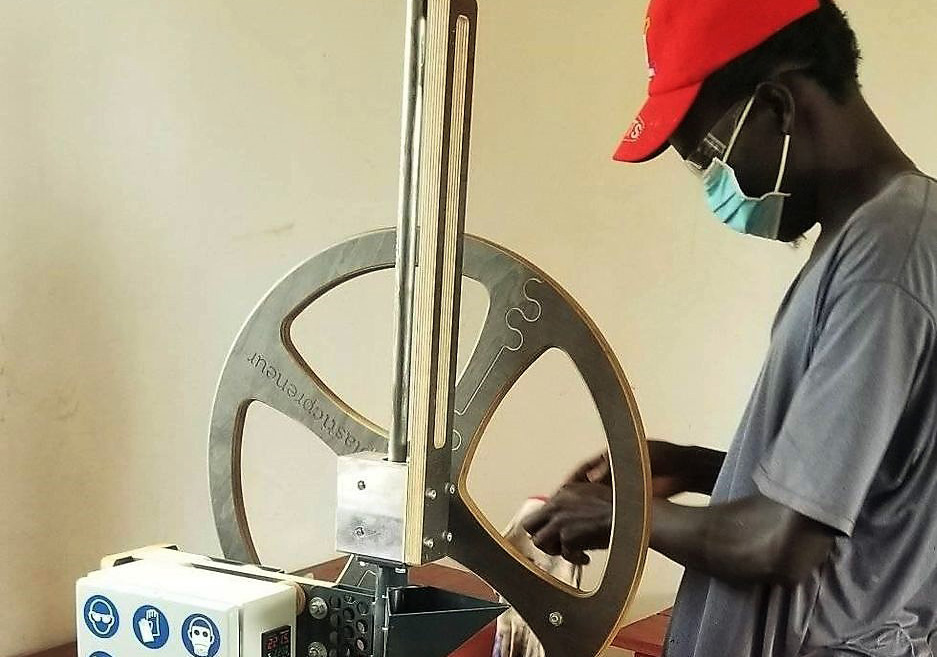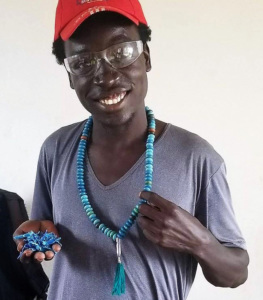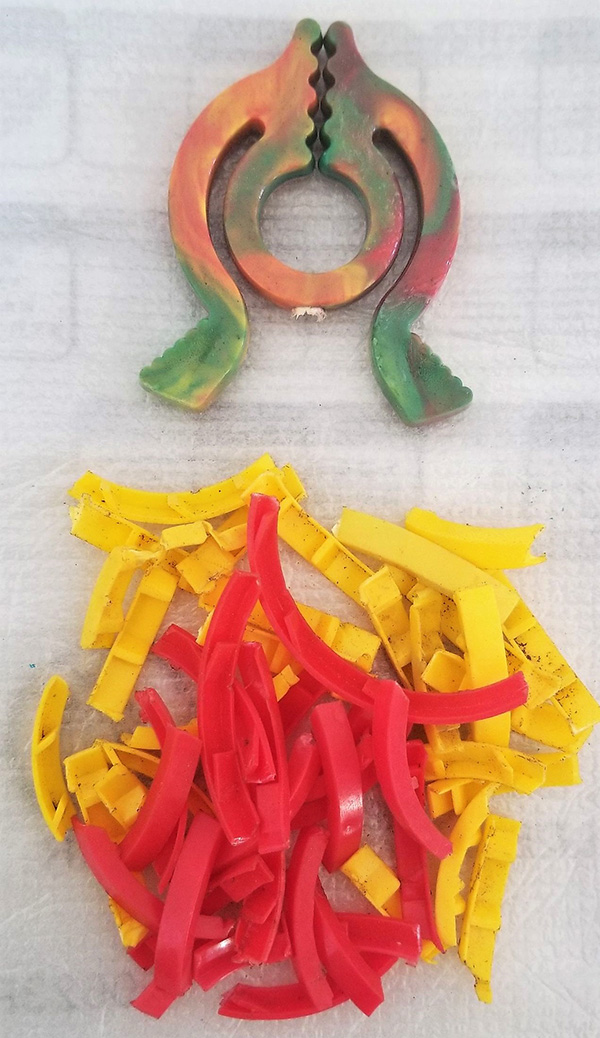Supporting young entrepreneur refugees in Uganda

In the shade of a mango tree many kilometers away from the nearest electricity line sits Emmanuel Lomoro on his laptop, where an almost robotic voice is heard: “Emmanuel, can you hear me? My wifi connection is disturbing me today.” Emmanuel knows the feeling of talking online and only getting back words like “I am sorry, could you repeat that” or “You are breaking up”, but today he is on a call with his mentor in Germany and having the better connection of the two, despite being in one of the least expected places for broadband internet. He sits in the middle of one of the world’s largest refugee settlements: Bidibidi, in northwestern Uganda, where over 270,000 South Sudanese refugees live. Emmanuel is the founder of Generous Designs Africa, a company which upcycles plastic waste into products. The internet connection is vital for Emmanuel and his business, especially during a strict second lockdown to prevent the spread of COVID-19. The lockdown forced all educational institutions to close again. Online learning is not an option for the majority of students in Uganda, as less than half of the population have access to electricity and mobile internet prices continue to soar
 Emmanuel is a Social Innovation Academy (SINA) scholar and, like his peers, is creating his own solutions to respond to the local challenges, such as creating a social enterprise to benefit himself and his community. SINA offers opportunities to marginalized youth in East Africa to join or create self-organized learning spaces. This solution empowers refugees to become active drivers of their own future by learning how to be in charge of themselves within self-organized and responsible communities called “SINAs.” By taking on new responsibilities and roles, young refugee youth gain new skills and create social enterprises while leveraging existing strengths and turning challenges into opportunities.
Emmanuel is a Social Innovation Academy (SINA) scholar and, like his peers, is creating his own solutions to respond to the local challenges, such as creating a social enterprise to benefit himself and his community. SINA offers opportunities to marginalized youth in East Africa to join or create self-organized learning spaces. This solution empowers refugees to become active drivers of their own future by learning how to be in charge of themselves within self-organized and responsible communities called “SINAs.” By taking on new responsibilities and roles, young refugee youth gain new skills and create social enterprises while leveraging existing strengths and turning challenges into opportunities.
In 2018 SINA became one of the first partners of the REACT platform, an initiative of the Global Business Coalition for Education which channels corporate contributions in support of education in emergencies. Through REACT, Avanti Communications partnered with SINA in 2019 to donate and provide solar-powered satellite broadband to the Bidibidi refugee camp. Internet connection is accessible within a 100m radius, allowing health standards to be followed during COVID-19. Today, refugee youth can access the internet for free and connect with the world. This connectivity offers many opportunities, including online courses, research for jobs, grant applications, and business training.
 SINA scholars understand that starting a business does not always require a lot of capital, but to think out of the box to find resources. Given the chance, youth tackle local problems themselves rather than rely on humanitarian organizations. For example, at Generous Designs Africa, refugees collect or bring in broken plastics, which are shredded, melted, and re-molded into products like educational materials. The refugee-owned company also creates backpacks and bags from upcycled plastic sheets. The team was able to establish a partnership with students from the European School of Management and Technology in Berlin. Before the pandemic, students travelled from Germany to Uganda to support business development. The internet also allows other members of the community to take part in online opportunities.
SINA scholars understand that starting a business does not always require a lot of capital, but to think out of the box to find resources. Given the chance, youth tackle local problems themselves rather than rely on humanitarian organizations. For example, at Generous Designs Africa, refugees collect or bring in broken plastics, which are shredded, melted, and re-molded into products like educational materials. The refugee-owned company also creates backpacks and bags from upcycled plastic sheets. The team was able to establish a partnership with students from the European School of Management and Technology in Berlin. Before the pandemic, students travelled from Germany to Uganda to support business development. The internet also allows other members of the community to take part in online opportunities.
Avanti has also donated and set up a second broadband internet connection for SINA’s Mpigi site. Since 2015, over 35 social enterprises have been established. Among them is Uganics which produces organic mosquito repellent soap. In 2020 Uganics was a finalist of the African Business Heroes, and won 100,000 USD in grant support.
From Mpigi in Uganda, the SINA model has now expanded to more refugee settlements in Uganda, the Democratic Republic of Congo, and even Zimbabwe, thanks to entrepreneurial refugees replicating the model and creating their own self-organized learning spaces. SINA is now looking for additional partners to scale up operations and provide more opportunities to entrepreneurial refugees.
